Councils 'coping well' with budget cuts says watchdog
- Published

Councils have seen income from parking charges drop
Most councils in England are coping well so far with the tight squeeze on their budgets but some face a "rocky road" ahead, a report suggests.
The Audit Commission said nine out of 10 councils would still balance their books despite an estimated £4.7bn fall in their combined income this year.
But the spending watchdog said pressure would become more acute as 60% of cuts to central funding had yet to kick in.
Ministers said "well-managed" councils could make do without key service cuts.
But Labour have warned that local authorities have been forced to front-load spending cuts and this has resulted in the closure of vital services and big job losses.
'Tough times'
Annual funding for local government from Whitehall is due to fall by 7.1% between 2011 and 2015 as part of the coalition's deficit reduction drive.
The Audit Commission said town halls had had to come to terms with a £3.5bn drop in central funding this year, including the effect of the freeze in council tax encouraged by ministers.
The weak state of the economy and the strain on families from rising prices has also reduced the amount of income councils can raise through charges and fees, on parking for instance, by £1.2bn.
Nevertheless, the watchdog said its research - based on council data and auditors' reports - suggested most councils were dealing with the tough financial settlement and expected still to stay in the black.
The majority of local authorities had been able to protect priority services, such as adult social care, with cutbacks focused in areas such as culture, planning and housing.
Councils were also responding by raising charges where they could, in areas such as waste management, the report found.
"We all know that councils, like the rest of the country, are experiencing tough times," said Michael O'Higgins, the watchdog's chairman.
"So far, councils have responded well to these challenges. Many have also protected the most vulnerable people in their area."
Although a small number of councils were facing potential financial difficulties, it said this could not be attributed purely to the impact of the cuts but also to poor management and financial discipline.
But the Audit Commission warned there were tougher times to come since the savings achieved this year only accounted for 16% of total council expenditure and could not be repeated in future years.
"With more reductions to come and wider economic problems intensifying the pressure, councils need to prepare for a potentially rocky road ahead," Mr Higgins added.
"They (councils) will also need to make some tough decisions about how to bridge the funding gap in the coming years."
'More for less'
The Local Government Association, which represents more than 400 councils in England and Wales, said council leaders had shown "sound and disciplined" financial management in the face of an "unprecedented" reduction in funding.
Ministers have encouraged councils to dip into their financial reserves, if necessary, to deal with short-term financial pressures and to cover the cost of restructuring.
But LGA chairman Sir Merrick Cockell said councils should only do this in order to pay for measures that would deliver longer-term benefits.
"Councils are managing and planning their budgets prudently and effectively and within their means rather than raiding the kitty in the short term and suffering the consequences in the longer term."
The Department of Local Government and Communities said councils were still expected to spend a total of £118bn this year, 2.6% lower than last year, and local authorities had the resources to protect vital services as well as keep council tax and other charges down.
"The report shows that well-managed councils do not need to compromise frontline services to make savings," local government minister Grant Shapps said.
"Councils can do more for less through better procurement, embracing transparency and more joint working. Councils which just cut the frontline or hike charges are guilty of poor leadership."
- Published18 July 2011
- Published1 March 2011
- Published1 December 2010